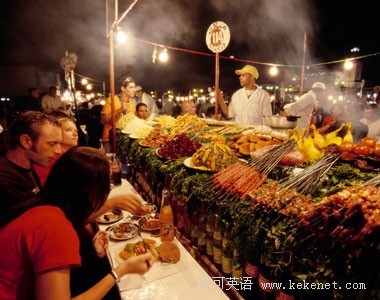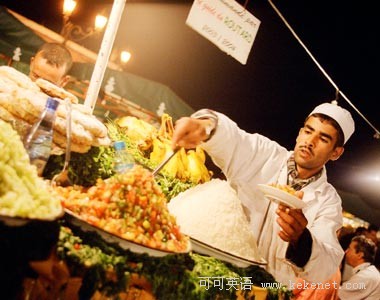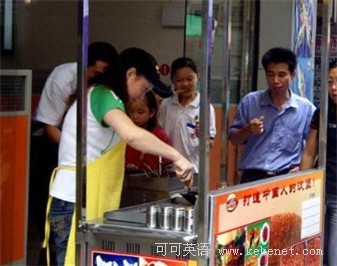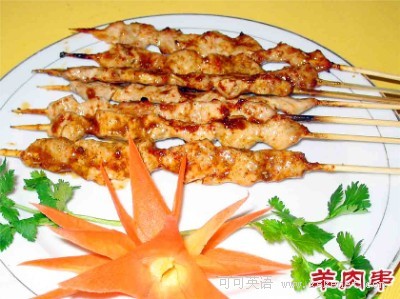(单词翻译:单击)
Is street food inherently more risky than eating in a restaurant when you travel? Sometimes, and it depends. Children, the elderly, and those with compromised immune systems are certainly more at risk of getting ill, and may be best off avoiding street eats. But there are certain precautionary measures healthy travelers can take before scarfing their tacos or mystery-meat kebabs that will minimize the chances of bringing home more than just a suitcase full of sweatshop-made tchotchkes as souvenirs. Read on.
旅游时在街头用餐是不是比在餐馆用餐的风险更大呢?某些时候,是的。如儿童、老人和免疫系统受损的人患病风险更高,故应避免街头食品。但旅客在食用玉米饼或特制烤羊肉串前也可以采取一些健康的预防措施,这就避免了带回家的只是满箱子血汗工厂制造的小纪念品。请看以下方法。
1. Is there a crowd? Just like at home, go where the locals go, as they obviously know where to find the good stuff. But high volume also means that food is being prepared fresh, rather than sitting around attracting flies and turning into something useful for waging biological warfare.
1、是否拥挤?就像在国内一样,跟着本地人走,因为他们知道哪里可以找到好东西。人多吵杂的地方意味着那里的食物是新鲜准备的,而不像有些餐馆静得只有苍蝇在飞,从而变成细菌战。

2. Are basic hygiene practices being implemented by the vendor(s)? In Mexico, I've frequently observed street vendors slipping clean plastic bags over plates. With every order, a new bag is used, then discarded at the end of the meal. It's an eco-nightmare, but it's a lot more sanitary than dunking a plate in a bucket of dingy water doubling as a petri dish. Also bear in mind that in many parts of the world, the left hand performs double-duty as toilet paper. I can't say it enough: Look at the sanitation practices before ordering.
2、店家(们)是否有基本的卫生习惯?在墨西哥,我经常看到摊贩用干净塑料袋装盘子。每一个订单都使用新的袋子,餐后再把袋子扔掉。虽说这是生态的噩梦,但却胜于把盘子扔进重复使用的脏水中而成为细菌滋生地。我们也应记住,世界上许多地方的人是用左手完成如厕动作的。我不能说这就足够了,但在下单之前应了解其卫生状况。
You'll often find co-workers whose sole responsibility is to handle money, to avoid cross-contaminating food (this isn't always the case, however, so sometimes you'll just have to--literally--suck it up). Once, when I accidentally handed my money to the wrong guy, he turned his hand upside-down to avoid contact with my filthy coins.
你常常会发现,同事一般都会自己负责给钱,以避免食物的交叉污染(虽并非总如此,但有时你必须按字面意思去做即可)。有一次,我不小心把钱给错了人,结果他将手翻过来,避免接触到我那脏脏的硬币。

3. Is the stand or cart clean and well-maintained? Is hot food kept hot or cooked to order, and is cold food cold? Is purified water or ice used for beverages and frozen treats?
3、摊位或推车是否保持整洁?熟食是否还热,或是下单时即煮?生冷食物是否还冷?是纯净水或是冰水和冰品?

4. Are the ingredients fresh? If you've got eyes, a nose, and some tastebuds, you can figure this out for yourself. I look at the condiments and garnishes to determine if I want to eat at a given stand or cart. If I see crusty bowls of salsa, dessicated limes, slimy herbs, or flies congregated on any raw foods I might potentially eat, I'm out of there.
4、原料是否新鲜?你可以用你的眼睛、鼻子和味蕾来分辨。我会先看看摊贩的调味品和配菜,再来决定是否要在特定的摊位或推车吃东西。如果我看到邋遢的沙拉、干干的酸橙、粘粘的香料,或是我想吃的食物原料上停着苍蝇,我马上离开那里。
If you're in a coastal region, it pays to do a bit of homework on the cleanliness of the local fresh and ocean water supplies; algae blooms or cholera outbreaks will be widely reported. Try to avoid eating raw river fish or seafood, or river fish/seafood from just offshore; remember that many developing island nations and coastal regions use high tide as their toilet. If you're eating pork in the Third World, always make sure it's well-cooked. While trichinosis has effectively been eradicated from our domestic industrial pork supply, the disease is prevalent in other parts of the world. And not to get too graphic, but you'll often find pigs in rural parts of the developing world lurking around latrines, searching for a snack.
如果你在沿海地区,你就要对当地的事物有所了解,如干净新鲜的海产品、水藻,以及广泛报道的霍乱疫情。尽量避免吃生河鱼或海鲜或近海地区的海产品。要谨记,许多发展中岛国和沿海地区以海潮作为他们的厕所。如果你在第三世界吃猪肉,一定要确保肉已煮熟,虽然国内的猪肉供应工业已有效根除了毛线虫病,但该疾病还普遍存在于世界其它地区。但也不要太讲究形象,在发展中国家的农村地区你经常会看到猪围在厕所周围觅食。
Fresh ingredients don't necessarily mean great food, but it helps. Delicious street food is ulimately a reflection of the loving care that goes into its preparation. Are the carnitas slightly crispy on the outside, with an interior succulent with greasy goodness? Is the masa in the tamales moist, with a sweet, earthy corn flavor? Are the noodles slightly toothsome, the herbs fresh and bright-tasting, the broth fragrant and piping hot? These things matter.
新鲜的食材并不意味着好吃,但却有益。美味的街头食物是一种精心准备的亲切关怀。carnitas外表略脆,里面却多汁油腻吗?湿润的玉米粉蒸肉充满着泥土的气息?美味的面条、清新亮丽的香草、甜美的热肉汤?这些都是你要关心的问题。

5. Use hand sanitizer before eating, take probiotics with live active cultures prophylactically, and pack a broad-spectrum gastrointestinal antibiotic and Imodium, just in case. I'm just saying.
5、饭前是否用洗手液洗手?吃的益生菌是否有活性益生菌群标志?是否是包装的胃肠道抗生素泻立停?我想说的是,以防万一。


